In a normal year, this is high season for events and trade shows. Instead, because 2020, I’m at home with no immediate prospect of travel. While this lack of travel does have some benefits, I do miss events, and I hope that things will get back to normal, because virtual events — or at least, the sorts of virtual events I have attended — simply do not work for me, and I’m not the only one.
One big issue is just reserving the time to "attend" the remote event, because when we’re working from home, there’s a lot of other stuff going on.
Since most of the people saying "virtual learning is the future" don't have kids, I've decided to break down what a normal day is like as a working mom with 3 kids.
— Amanda Goetz (@AmandaMGoetz) June 25, 2020
To be fair, I also hope that we will learn from this year and add more and better options for remote attendees than just a video stream of the keynote, which has been the standard until now. I have not yet seen an event format that replicated what I love about in-person events, but there is value in doing that if we can, because whoever achieves that feat will unlock enormous amounts of value, for themselves and for their event’s attendees.
The environment is also benefiting from all of us being grounded instead of burning jet fuel, (although my luggage1 is getting very dusty!). On the other hand, the local economy in places that typically host events is suffering badly — although one sector that I hope stays dead is the one that generates useless conference swag.
Time Is Value
The most important factor is the dedicated time. An event that I attend from home will inevitably need to fit in around other tasks, personal and professional. Instead, if I have travelled somewhere and blocked out a day or a few days, I am motivated to make the most of that investment, and minimise other activities. There is also a feeling that I have permission to postpone everything else if I’m at an in-person event in a way that I at least do not feel that I have for virtual events.
There’s another aspect to time that is often overlooked, though, and that is time zones. If an in-person event is in a certain location, all the attendees agree to base their schedules on the local time zone. If it’s remote, all bets are off. Yes, there have been experiments with "follow-the-sun" conferences, with people either giving the same presentation several times, or recordings being rebroadcast after an offset, but it’s still not the same as all being there together, plus you also lose out on having one single conversation going on via Twitter or whatever social media about your announcements.

Hell Is No Other People
While perhaps not as quantifiable, the serendipitous networking is the aspect of in-person events the I miss the most, and certainly the hardest to reproduce online. You can have great conversations even just standing in the booth, if you ask punters questions about their work and situation instead of just regurgitating the same tired sales spiel for the Nth time.
In technical terms, you’re probably going to be able to give a better answer if you understand what the actual goal is. The first phrasing of a question from someone unfamiliar with your technology is probably not going to tell you that, because they are framing the question in terms of what they do know. Of course you’ll be even better placed if you can answer them in the context of what they know: "in Technology X that is indeed what you would want to do, but it has the following downsides: a, b, c; instead, in Technology Y we achieve the same goal in this other way, which delivers these benefits: foo, bar, baz; would you like to see a demo?".
A conference booth is also a great environment to practice your pitch many times, over and over, in relatively low-stakes conversations, and with lots of colleagues around you to ask for support or after-action critiques. I stood up in a booth on day two of my current gig, and by the end of the day I had learned more about actual customer needs and perception than in any office onboarding course.
Beyond that, I have benefited enormously from being dragged along in the wake of more senior colleagues, meeting people and participating in conversations that let me understand better how my industry worked. Just the questions that get asked in these senior-level conversations will tell you a lot, and topics that come up will tell you what is currently hot, what terminology is expected, and so on. In more recent years, I’ve been the one getting the invites, and so I try to bring other team mates along to benefit from their perspective and help them in their own careers.
In other words, it’s not (just) about the free drinks…

What Can We Do
There are some suggestions people have shared with me for how to improve remote events, which might also be applied as extensions to in-person events. After all, big events like WWDC or AWS re:Invent are already effectively remote events: even people who’re in town for the show end up watching video streams. Many people don't even have tickets, but they travel anyway for the networking and because everybody else is there, making it easier to meet a lot of people over the course of a week whom you would not normally have access to. Unfortunately, I am not quite convinced by any of these suggestions, precisely because they miss out on the reasons why people might travel to an event and only ever stay on its fringes.
Watch Parties
To combine remote events with at least some networking, some have suggested local user groups or similar organisations could meet up to watch the stream together. To me, this is the worst of both worlds, because I would still have to travel a bit, at least up to Milan, but my networking there would be restricted to the people who live and work there, who by and large are not relevant to me; my job is worldwide, not local or regional. This is the same objection I have to the suggestion of many local events instead of one big global event; I am specifically looking forward to getting together with everyone in the world who is interested in the same things I am. This sort of thing might make some sense if you’re in NYC and not wanting to travel to SF, or just not wanting to go to Vegas (sensible!), but it sucks for the lone person in Omaha or whatever who’s into that topic (replace US locales with your own; the same thing happens in every country/region). And again, time zones will complicate this. If you’re in Sydney, it’s going to be tough to follow a livestream from San Francisco or Amsterdam.
Portals!
I have been in many offices that have always-on video conferencing setups, usually in the kitchen or other common space, so that when you walk past you can wave at someone in the office in Bengaluru or wherever. This is the next step up from the social media walls that you (used to) see at in/person events, but again it seems to be a gimmick; a week after the first installation, nobody looks at the screens any more. They sometimes get used for all-hands meetings or similar occasions, but that’s it. They are more of a "digital transformation" checkbox, like the iPad for signing in on the front desk; gimmicks for companies trying to show how global and interconnected they are, rather than any sort of practical solution.
Another gimmicky technology that many expected to transform our lives is VR, but that's not working either, or at least not yet.
Look at the numbers
Attendance numbers are also not comparable between in-person and online-only events. The smaller numbers of people who attend in-person events have demonstrated significant commitment and are ipso facto extremely valuable contacts. The far larger numbers of people who register for online events have not made any such commitment; in fact, many have no intention of attending the live event at all, but will only look at a handful of recordings, potentially days, weeks, or even months later. How do you discount the quality of that lead? Is it any better than a webinar lead? Is it worse because of dilution (you don’t know which one session they were really interested in)?
So What?
Unfortunately, I have not found any good solutions. The best we can hope for is that by this time in 2021, we can once again have in-person events in safety, but that we also learn something about complementing the in-person experience with at least some remote-access options. Those remote options should also allow for time-shifting, whether by a few hours for people in other time zones, or by much longer periods for later review. The assumption that all speaking sessions are recorded should help ensure better content, as well as better outcomes for sessions that suffer from being scheduled across from a session on a hot topic or with a big-name speaker.
I’ll see you in my employer’s booth, and don’t forget to come to my session later!
🖼️ Photos by Samuel Pereira and The Climate Reality Project on Unsplash
-
I even decided not to use a discount code for a piece of luggage I have wanted for ages, because I have no idea when I’ll get to use a carry-on bag again. ↩